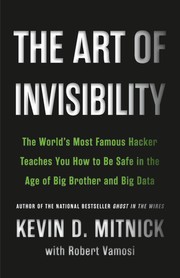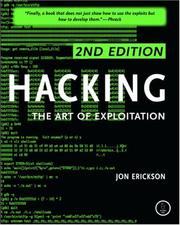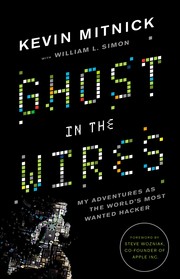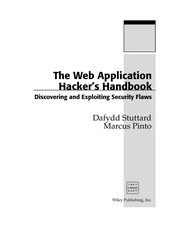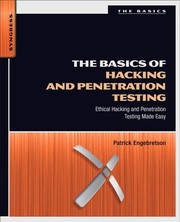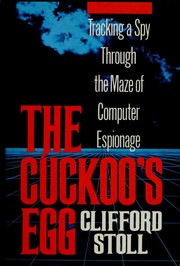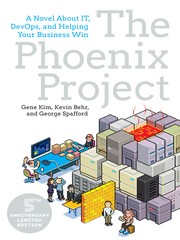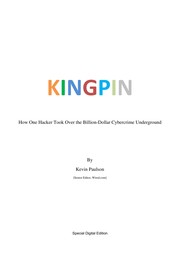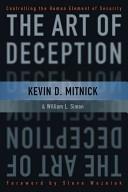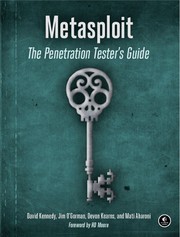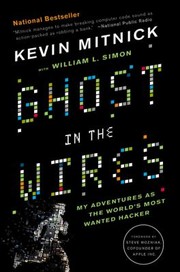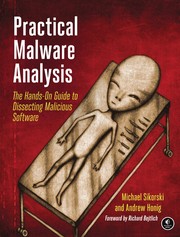Are you fascinated by the world of hacking and cybersecurity? Whether you’re an aspiring ethical hacker or just curious about the world of cyber espionage, there are plenty of books on hacking that can quench your thirst for knowledge. From technical manuals to thrilling fiction, the world of hacking books is vast and diverse. In this article, we’ll explore the 20 best books about hacking that will educate and entertain you, no matter your level of expertise. Get ready to dive into the exciting world of cybercrime and cybersecurity!
Contents
- 1 20 Best Books About Hacking
- 2 The Art of Invisibility
- 3 Hacking: The Art of Exploitation
- 4 Ghost in the Wires
- 5 The Web Application Hacker’s Handbook: Finding and Exploiting Security Flaws
- 6 Social Engineering: The Art of Human Hacking
- 7 The Basics of Hacking and Penetration Testing: Ethical Hacking and Penetration Testing Made Easy
- 8 The Cuckoo’s Egg: Tracking a Spy Through the Maze of Computer Espionage
- 9 The Code Book: The Science of Secrecy from Ancient Egypt to Quantum Cryptography
- 10 The Phoenix Project: A Novel About IT, DevOps, and Helping Your Business Win
- 11 The Tangled Web: A Guide to Securing Modern Web Applications
- 12 The Cyber Effect: A Pioneering Cyberpsychologist Explains How Human Behavior Changes Online
- 13 Kingpin: How One Hacker Took Over the Billion-Dollar Cybercrime Underground
- 14 The Art of Deception: Controlling the Human Element of Security
- 15 The Smart Girl’s Guide to Privacy: Practical Tips for Staying Safe Online
- 16 The Art of Invisibility: The World’s Most Famous Hacker Teaches You How to Be Safe in the Age of Big Brother and Big Data
- 17 Metasploit: The Penetration Tester’s Guide
- 18 The Web Application Hacker’s Handbook: Finding and Exploiting Security Flaws
- 19 Ghost in the Wires: My Adventures as the World’s Most Wanted Hacker
- 20 Practical Malware Analysis: The Hands-On Guide to Dissecting Malicious Software
- 21 Metasploit: The Penetration Tester’s Guide
- 22 Conclusion
- 23
- 24 Prison Escapes Books: A Curated 2024 Updated List
- 25 Books about Abe Lincoln: 2024 Updated Guide to Essential Reading
- 26 Top 20 Best Books on Fossils:2024 Edition
20 Best Books About Hacking
The Art of Invisibility
by Kevin Mitnick
The Art of Invisibility by Kevin Mitnick is a gripping book about the world of cybersecurity and how to protect yourself online. Mitnick, a former hacker turned security consultant, delves into the dark world of cybercrime and provides valuable insights into how hackers operate. The book is a comprehensive guide to staying safe in the digital age, covering topics such as online privacy, social engineering, and the importance of using encryption. Mitnick also shares real-life examples and cautionary tales to illustrate the potential dangers of the internet. Whether you’re a cybersecurity professional or just a regular internet user, this hacking book is a must-read for anyone who wants to understand the threats lurking in cyberspace and learn how to defend against them.
Hacking: The Art of Exploitation
by Jon Erickson
Hacking: The Art of Exploitation by Jon Erickson is a must-read for anyone interested in the world of cybersecurity and computer programming. This engaging and comprehensive book about hacking takes readers on a journey through the intricate world of computer security and exposes the inner workings of hacking techniques. With a hands-on approach, Erickson delves into the technical details of hacking, providing readers with practical examples and exercises to develop their skills in understanding and combating cyber threats. This hacking book is not just for the expert hacker, but also for those looking to gain a deeper understanding of computer systems and network security. It’s a fascinating and eye-opening exploration of the art of exploiting computer systems and a valuable resource for anyone interested in the field of cybersecurity.
Ghost in the Wires
by Kevin Mitnick
Ghost in the Wires is a gripping autobiography by Kevin Mitnick, a notorious hacker who eluded the FBI for years. The book details Mitnick’s early fascination with computers, his entry into the world of hacking, and his cat-and-mouse game with authorities. Mitnick shares his thrilling escapades, including his social engineering techniques and intricate computer intrusions, making it a must-read for anyone interested in cybersecurity and digital crime. This hacking book provides a rare glimpse into the mind of a master hacker, offering insights into the vulnerabilities of computer systems and the art of deception. Mitnick’s storytelling is both thrilling and educational, making Ghost in the Wires a compelling read for anyone curious about the world of hacking.
The Web Application Hacker’s Handbook: Finding and Exploiting Security Flaws
by Dafydd Stuttard and Marcus Pinto
The Web Application Hacker’s Handbook is a comprehensive and practical guide for anyone interested in the world of web security. Written by Dafydd Stuttard and Marcus Pinto, this book delves into the intricate world of finding and exploiting security flaws in web applications. The authors provide a detailed overview of the latest hacking techniques and methodologies, making it an indispensable resource for cybersecurity professionals, web developers, and ethical hackers. The book covers a wide range of topics, including hacking methodologies, advanced attacks, and the latest tools and techniques used by hackers. Whether you’re a seasoned professional or just starting out, this book on hacking is an essential addition to your library, offering valuable insights into the world of web security.
Social Engineering: The Art of Human Hacking
by Christopher Hadnagy
Social Engineering: The Art of Human Hacking by Christopher Hadnagy is a fascinating exploration of the psychological manipulation techniques used by hackers to exploit human behavior and gain unauthorized access to systems and information. This insightful book delves into the tactics and strategies employed by social engineers to deceive and manipulate individuals into divulging sensitive information or performing actions that compromise security. Hadnagy provides real-world examples and practical guidance on how to recognize and defend against these social engineering attacks. Whether you’re a cybersecurity professional, a business leader, or simply curious about human behavior and security, this hacking book offers valuable insights into the art of manipulating people for illicit gain.
The Basics of Hacking and Penetration Testing: Ethical Hacking and Penetration Testing Made Easy
by Patrick Engebretson
The Basics of Hacking and Penetration Testing: Ethical Hacking and Penetration Testing Made Easy by Patrick Engebretson is a comprehensive guide for anyone interested in the world of cybersecurity. This book on hacking provides a detailed overview of ethical hacking and penetration testing, making it accessible and understandable for beginners. Engebretson covers the essential techniques and tools used by ethical hackers and penetration testers, providing practical examples and step-by-step instructions to help readers grasp the concepts easily. Whether you are a novice or an experienced professional, this hacking book is a valuable resource for learning the fundamentals of ethical hacking and penetration testing. With its clear and concise explanations, it’s a must-read for anyone looking to dive into the exciting world of cybersecurity.
The Cuckoo’s Egg: Tracking a Spy Through the Maze of Computer Espionage
by Clifford Stoll
The Cuckoo’s Egg: Tracking a Spy Through the Maze of Computer Espionage by Clifford Stoll is a captivating non-fiction book on hacking that follows the true story of a young astronomer turned computer expert who discovers a 75-cent discrepancy in his department’s accounting records. This seemingly insignificant anomaly leads him down a rabbit hole of cyber espionage, as he uncovers a hacker stealing sensitive information from U.S. military and research institutions. Stoll’s relentless pursuit of the hacker takes readers on a thrilling journey through the early days of the internet, as he races against time to unravel the mystery and bring the perpetrator to justice. The book about hacking is a gripping account of one man’s determination to hunt down a cybercriminal and the technological cat-and-mouse game that ensues, making it a must-read for anyone interested in cybersecurity and true crime.
The Code Book: The Science of Secrecy from Ancient Egypt to Quantum Cryptography
by Simon Singh
The Code Book by Simon Singh is a fascinating journey through the history of cryptography, from the ancient hieroglyphics of Egypt to the cutting-edge quantum cryptography of today. This book delves into the world of secret codes, ciphers, and the individuals who have used them to send hidden messages throughout history. It explores the impact of cryptography on warfare, politics, and personal privacy, shedding light on the power of encryption and the constant battle between code makers and code breakers. With a blend of storytelling and technical explanations, The Code Book is a captivating read for anyone interested in the art of secret communication and the evolution of cryptography. Whether you’re a history buff, a technology enthusiast, or simply curious about the world of secrecy, this book will open your eyes to the hidden world of codes and ciphers.
The Phoenix Project: A Novel About IT, DevOps, and Helping Your Business Win
by Gene Kim, Kevin Behr, and George Spafford
The Phoenix Project is a captivating novel that takes readers on a thrilling journey through the world of IT, DevOps, and the challenges businesses face in today’s fast-paced digital landscape. Written by Gene Kim, Kevin Behr, and George Spafford, this book offers a unique blend of storytelling and practical insights, making it an essential read for anyone interested in IT operations and business transformation. As the story unfolds, readers are introduced to the protagonist, Bill, who is tasked with turning around a failing IT project at Parts Unlimited. Through his experiences, readers gain valuable lessons on overcoming obstacles, implementing DevOps principles, and ultimately helping the business succeed. This book is a must-read for anyone looking to understand the intricacies of modern IT and the strategies needed to drive business success.
The Tangled Web: A Guide to Securing Modern Web Applications
by Michal Zalewski
The Tangled Web: A Guide to Securing Modern Web Applications by Michal Zalewski is a comprehensive and eye-opening book on web security. Zalewski, a renowned expert in the field, delves into the intricate world of web security, providing readers with a deep understanding of the vulnerabilities and risks associated with modern web applications. This isn’t just a book about hacking; it’s a guide to understanding the complexities of web security and learning how to protect against various attacks. Zalewski’s writing style is engaging and accessible, making this book a must-read for anyone involved in web development or cybersecurity. Whether you’re a seasoned professional or a novice in the field, The Tangled Web offers invaluable insights and practical advice for securing web applications in today’s digital landscape.
The Cyber Effect: A Pioneering Cyberpsychologist Explains How Human Behavior Changes Online
by Mary Aiken
The Cyber Effect by Mary Aiken is a groundbreaking exploration of how the digital world is impacting human behavior. Aiken, a pioneering cyberpsychologist, delves into the ways in which our online activities are shaping our thoughts, actions, and relationships. She examines the psychological and neurological effects of technology, from social media and online gaming to cyberbullying and criminal behavior. With a blend of research and real-life case studies, Aiken offers valuable insights into the cyber realm and its influence on our lives. This thought-provoking book is essential reading for anyone interested in understanding the impact of the digital age on human behavior. Whether you’re a parent, educator, or simply curious about the intersection of psychology and technology, The Cyber Effect provides a fascinating and eye-opening perspective on the complex dynamics of our online world.
Kingpin: How One Hacker Took Over the Billion-Dollar Cybercrime Underground
by Kevin Poulsen
Kingpin: How One Hacker Took Over the Billion-Dollar Cybercrime Underground by Kevin Poulsen is a gripping book on hacking that delves into the true story of Max Butler, a talented computer programmer turned cybercriminal. The book offers a fascinating look into the world of cybercrime, detailing how Butler managed to build an empire by hacking into financial institutions and stealing millions of dollars. Poulsen’s skillful storytelling and in-depth research provide readers with a thrilling account of Butler’s rise to power and the cat-and-mouse game he played with law enforcement. This hacking book is not just a tale of crime, but also a study of the vulnerabilities in our digital world and the lengths individuals will go to exploit them. Kingpin is a must-read for anyone interested in cybersecurity, true crime, and the darker side of the internet.
The Art of Deception: Controlling the Human Element of Security
by Kevin Mitnick and William L. Simon
The Art of Deception: Controlling the Human Element of Security is a captivating book about hacking written by Kevin Mitnick and William L. Simon. This eye-opening book delves into the world of social engineering, exploring how hackers exploit human behavior to gain unauthorized access to sensitive information. Mitnick, a former hacker turned security consultant, shares real-life stories and examples of how individuals and organizations have fallen victim to social engineering attacks. The authors provide valuable insights into the psychology of deception and offer practical advice on how to recognize and defend against these tactics. Whether you’re an IT professional, business owner, or simply curious about cybersecurity, this hacking book sheds light on the often overlooked human element of security and is a must-read for anyone concerned about protecting themselves and their organizations from cyber threats.
The Smart Girl’s Guide to Privacy: Practical Tips for Staying Safe Online
by Violet Blue
The Smart Girl’s Guide to Privacy by Violet Blue is a must-read for anyone looking to protect themselves online. This book provides practical tips and advice for staying safe in the digital world, covering everything from social media privacy settings to secure communication tools. With a focus on empowering women to take control of their online privacy, this book offers valuable insights into the potential risks and dangers of the internet, as well as strategies for minimizing them. Whether you’re a tech-savvy individual or just starting to navigate the complexities of online privacy, this book is an essential resource for anyone looking to safeguard their personal information and digital identity. By reading this book, you’ll be equipped with the knowledge and tools to navigate the digital world safely and confidently.
The Art of Invisibility: The World’s Most Famous Hacker Teaches You How to Be Safe in the Age of Big Brother and Big Data
by Kevin Mitnick
The Art of Invisibility is a gripping book on hacking, written by the world-renowned hacker, Kevin Mitnick. In this eye-opening guide, Mitnick reveals the secrets of how to protect yourself in the digital age, where Big Brother and Big Data are constantly threatening our privacy. With his extensive knowledge and expertise, Mitnick provides valuable insights into the world of cybersecurity, offering practical tips and techniques for evading hackers, spies, and cybercriminals. Whether you’re concerned about online privacy, data breaches, or identity theft, this hacking book is an essential read for anyone looking to safeguard their digital presence. Mitnick’s engaging writing style and real-life examples make this book about hacking a must-read for anyone who wants to stay safe and secure in today’s interconnected world.
Metasploit: The Penetration Tester’s Guide
by David Kennedy
Metasploit: The Penetration Tester’s Guide by David Kennedy is a comprehensive book on hacking that provides an in-depth look at the Metasploit framework, a powerful tool used by penetration testers and security professionals. The book delves into the various features and capabilities of Metasploit, offering practical guidance on how to use it to find and exploit vulnerabilities in systems. With step-by-step tutorials and real-world examples, readers will learn how to effectively utilize Metasploit for conducting ethical hacking and security assessments. This book about hacking is an essential resource for anyone looking to enhance their understanding of penetration testing and improve their skills in identifying and addressing security weaknesses.
The Web Application Hacker’s Handbook: Finding and Exploiting Security Flaws
by Dafydd Stuttard, Marcus Pinto
The Web Application Hacker’s Handbook is a comprehensive guide to understanding and exploiting the security flaws in web applications. Written by Dafydd Stuttard and Marcus Pinto, this book delves into the world of ethical hacking, providing readers with valuable insights into the techniques and tools used by malicious hackers. With a focus on practical methods for identifying and exploiting vulnerabilities, this book is an essential resource for security professionals, web developers, and anyone interested in the world of cybersecurity. By exploring real-world examples and case studies, the authors provide a hands-on approach to learning about web application security. Whether you’re a beginner or an experienced professional, this book is an invaluable resource for understanding the intricacies of web application security and learning how to protect against potential threats.
Ghost in the Wires: My Adventures as the World’s Most Wanted Hacker
by Kevin Mitnick
Ghost in the Wires is a captivating memoir that delves into the world of cybercrime. Written by Kevin Mitnick, a former hacker turned security consultant, the book provides an enthralling account of his adventures as one of the world’s most notorious hackers. Mitnick takes readers on a thrilling journey through his experiences of eluding law enforcement and hacking into some of the most secure computer systems.
Through his gripping storytelling, Mitnick offers valuable insights into the world of cybercrime and the vulnerabilities of digital systems. With its mix of suspense, intrigue, and technical details, Ghost in the Wires is a must-read for anyone interested in cybersecurity, technology, or the darker side of the digital world. This hacking book is a fascinating exploration of the cat-and-mouse game between hackers and the authorities, making it a compelling read for tech enthusiasts and true-crime aficionados alike.
Practical Malware Analysis: The Hands-On Guide to Dissecting Malicious Software
by Michael Sikorski, Andrew Honig
Practical Malware Analysis is a comprehensive guide for aspiring cybersecurity professionals and analysts seeking to dive into the world of dissecting malicious software. Written by Michael Sikorski and Andrew Honig, this hands-on book provides practical, real-world examples and step-by-step tutorials for learning malware analysis. From setting up a lab environment to reverse engineering and unpacking malware, this book equips readers with the necessary skills to understand and combat cyber threats. Whether you’re a beginner or an experienced professional, this hacking book offers valuable insights and techniques for dissecting and understanding the inner workings of malware. Practical Malware Analysis is an essential resource for anyone looking to develop expertise in cybersecurity and combat the ever-evolving landscape of cyber threats.
Metasploit: The Penetration Tester’s Guide
by David Kennedy, Jim O’Gorman, Devon Kearns, and Mati Aharoni
Metasploit: The Penetration Tester’s Guide is an in-depth and comprehensive book on hacking, written by David Kennedy, Jim O’Gorman, Devon Kearns, and Mati Aharoni. This book is a valuable resource for anyone interested in learning about penetration testing and ethical hacking. It covers a wide range of topics, including information gathering, vulnerability analysis, exploitation, and post-exploitation techniques using the Metasploit framework. The authors provide practical guidance and real-world examples, making it an essential read for both beginners and experienced professionals in the field of cybersecurity. Whether you are looking to enhance your skills or gain a deeper understanding of hacking methodologies, this book about hacking is a must-have for anyone interested in the world of cybersecurity.
Conclusion
In conclusion, these 20 books about Hacking provide a comprehensive and insightful look into the world of cybersecurity and hacking. Whether you are a beginner looking to learn the basics or an experienced professional seeking advanced techniques, these books offer valuable knowledge and practical skills. With in-depth discussions on ethical hacking, penetration testing, and cybersecurity strategies, these books are essential reads for anyone interested in the field of hacking. Happy reading and happy hacking!
Which Hacking book is best?
The best book on Hacking can vary with personal preference, but three widely recommended titles are:
- The Art of Invisibility by Kevin Mitnick,
- Hacking: The Art of Exploitation by Jon Erickson,
- Ghost in the Wires by Kevin Mitnick.
Each offers valuable insights and could be a great starting point.
What are the best books to learn about Hacking?
For those looking to learn about Hacking, there is a wealth of literature that can provide a comprehensive understanding of the subject. Some of the most highly recommended books include:
- The Art of Invisibility by Kevin Mitnick,
- Hacking: The Art of Exploitation by Jon Erickson,
- Ghost in the Wires by Kevin Mitnick,
- The Web Application Hacker’s Handbook: Finding and Exploiting Security Flaws by Dafydd Stuttard and Marcus Pinto,
- Social Engineering: The Art of Human Hacking by Christopher Hadnagy,
- The Basics of Hacking and Penetration Testing: Ethical Hacking and Penetration Testing Made Easy by Patrick Engebretson,
- The Cuckoo’s Egg: Tracking a Spy Through the Maze of Computer Espionage by Clifford Stoll,
- The Code Book: The Science of Secrecy from Ancient Egypt to Quantum Cryptography by Simon Singh,
- The Phoenix Project: A Novel About IT, DevOps, and Helping Your Business Win by Gene Kim, Kevin Behr, and George Spafford,
- The Tangled Web: A Guide to Securing Modern Web Applications by Michal Zalewski
These books offer a range of perspectives on Hacking, covering various aspects and approaches to the subject.
What are the best books on Hacking?
The best books on Hacking include:
- The Art of Invisibility by Kevin Mitnick,
- Hacking: The Art of Exploitation by Jon Erickson,
- The Cyber Effect: A Pioneering Cyberpsychologist Explains How Human Behavior Changes Online by Mary Aiken,
- Kingpin: How One Hacker Took Over the Billion-Dollar Cybercrime Underground by Kevin Poulsen,
- The Code Book: The Science of Secrecy from Ancient Egypt to Quantum Cryptography by Simon Singh,
- The Basics of Hacking and Penetration Testing: Ethical Hacking and Penetration Testing Made Easy by Patrick Engebretson.
Each offers unique insights into the subject. While these books on the topic of Hacking are highly regarded, it’s important to note that any list of ‘best’ books is subjective and reflects a range of opinions.
What are the best Hacking books of all time?
Choosing the best Hacking books of all time can vary depending on who you ask, but seven titles that are often celebrated include
- The Art of Invisibility by Kevin Mitnick,
- Hacking: The Art of Exploitation by Jon Erickson,
- Social Engineering: The Art of Human Hacking by Christopher Hadnagy,
- The Code Book: The Science of Secrecy from Ancient Egypt to Quantum Cryptography by Simon Singh,
- The Tangled Web: A Guide to Securing Modern Web Applications by Michal Zalewski,
- Kingpin: How One Hacker Took Over the Billion-Dollar Cybercrime Underground by Kevin Poulsen,
- and The Cyber Effect: A Pioneering Cyberpsychologist Explains How Human Behavior Changes Online by Mary Aiken.
Each of these books has made a significant impact in the field of Hacking and continues to be influential today.

